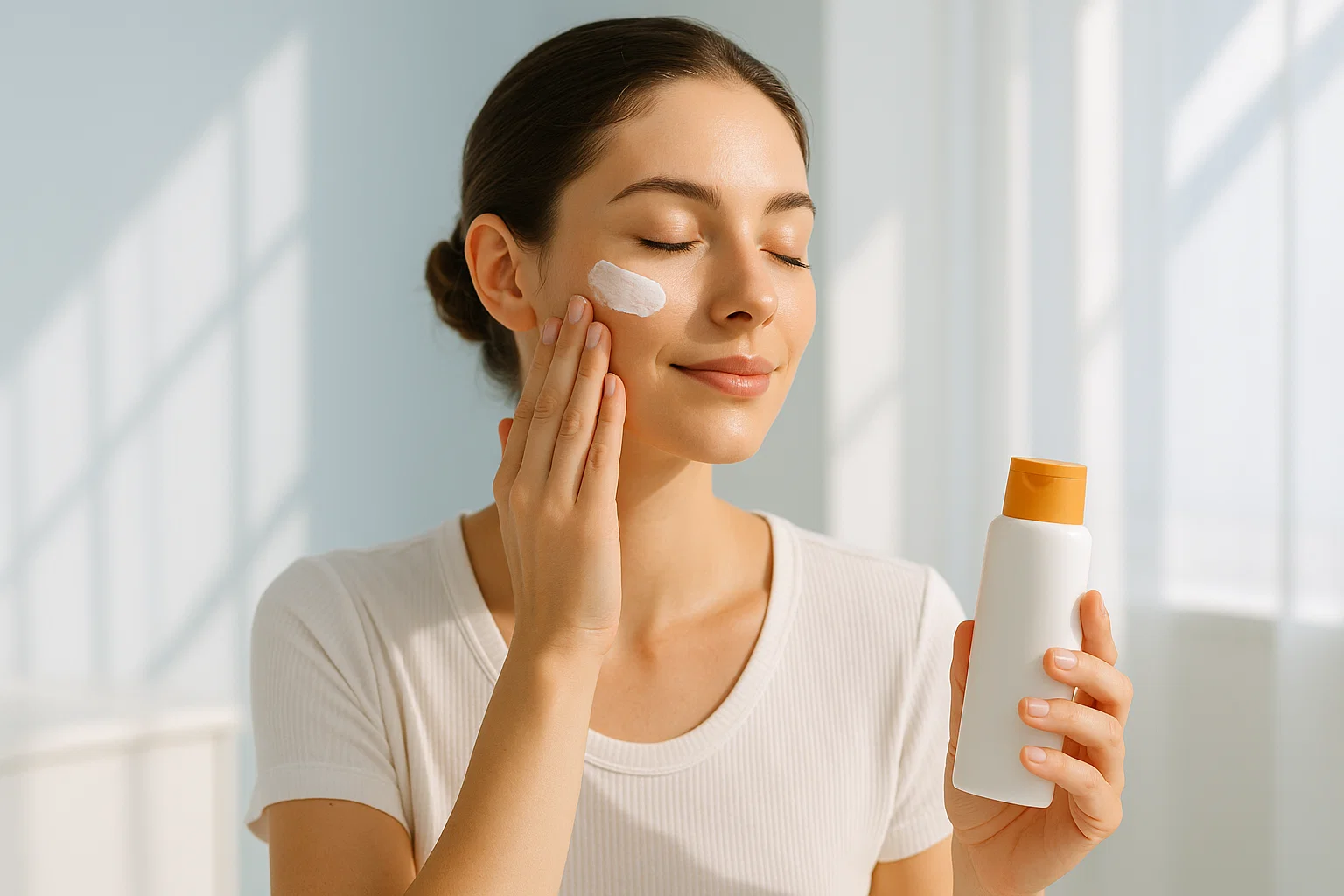At Dermacian, dermatologists educate patients that sunscreen is more than a cosmetic product — it’s a scientifically formulated barrier between your skin and invisible UV damage.

Understanding How Sunscreen Works
Sunscreen protects the skin by either absorbing, reflecting, or scattering harmful ultraviolet radiation. It forms a thin layer on the skin that neutralizes UV rays before they can penetrate deeper layers where they cause cellular damage.
1. The Two Types of UV Rays
-
UVA Rays (Aging Rays):
Penetrate deeply into the skin, leading to premature wrinkles, fine lines, and pigmentation. UVA rays can even pass through glass and clouds — meaning indoor exposure still counts. -
UVB Rays (Burning Rays):
Affect the skin’s outer layer and cause sunburns. Prolonged exposure increases the risk of DNA mutations and skin cancer.
Both UVA and UVB rays are dangerous in different ways, and a good sunscreen should protect against both — labeled as “broad-spectrum.”
Decoding SPF: What It Really Means
SPF, or Sun Protection Factor, measures how effectively a sunscreen protects against UVB rays — the ones that cause sunburn.
For example:
If your unprotected skin starts to burn after 10 minutes, an SPF 30 sunscreen theoretically allows you to stay in the sun 30 times longer (i.e., 300 minutes) before burning.
However, SPF isn’t just about duration; it’s about percentage of UVB blocked:
-
SPF 15 blocks ~93% of UVB rays
-
SPF 30 blocks ~97%
-
SPF 50 blocks ~98%
The difference between SPF 30 and SPF 50 may seem small, but it’s crucial for people with sensitive skin, pigmentation issues, or prolonged sun exposure.
Types of Sunscreens: Physical vs Chemical
Sunscreens come in two main categories based on how they protect your skin:
1. Physical (Mineral) Sunscreens
-
Ingredients: Zinc oxide, Titanium dioxide
-
How They Work: Reflect and scatter UV rays from the skin’s surface
-
Best For: Sensitive or acne-prone skin
-
Pros: Immediate protection after application, minimal irritation
-
Cons: Can leave a white cast on darker skin tones
2. Chemical Sunscreens
-
Ingredients: Avobenzone, Octocrylene, Oxybenzone, Homosalate
-
How They Work: Absorb UV rays and convert them into harmless heat
-
Best For: Normal to oily skin
-
Pros: Lightweight texture, easy to layer under makeup
-
Cons: Require 15–20 minutes after application to become effective
Modern sunscreens often use a hybrid formula — blending both physical and chemical filters for comprehensive, comfortable protection.
Why Daily Sunscreen Matters — Even Indoors
Many people skip sunscreen thinking they’re safe indoors or in the shade. The truth?
Up to 50% of UVA rays can still penetrate windows, car glass, and even some fabrics.
Additionally, blue light (HEV) emitted by phones, laptops, and screens contributes to oxidative stress and pigmentation.
Dermatologists now recommend daily SPF 30 or higher, even for those working from home, to prevent photoaging — premature wrinkles, dark spots, and loss of elasticity caused by chronic light exposure.
SPF and Skin Health: Beyond Sunburn Protection
1. Preventing Premature Aging
UV exposure accelerates collagen breakdown, leading to wrinkles, sagging, and dullness. Long-term use of sunscreen is scientifically proven to reduce signs of aging by 24–30%.
2. Reducing Pigmentation and Uneven Tone
Regular sunscreen prevents hyperpigmentation and melasma — common concerns in Indian skin types prone to post-inflammatory dark spots after acne or injury.
3. Lowering Skin Cancer Risk
Sunscreen is your first line of defense against basal cell carcinoma and melanoma, two of the most common types of skin cancer. Continuous use reduces your lifetime risk significantly.
4. Supporting Skin Barrier Function
Some sunscreens now contain antioxidants and ceramides, which strengthen the skin barrier and reduce inflammation, helping those with rosacea or eczema.
Common Sunscreen Myths — Debunked by Science
Myth 1: Sunscreen Is Only for Fair Skin
UV damage affects all skin tones. While darker skin may be less prone to burning, it’s equally susceptible to pigmentation, aging, and DNA damage.
Myth 2: You Don’t Need Sunscreen on Cloudy Days
Up to 80% of UV rays can penetrate clouds. Even during monsoon or winter, your skin needs daily protection.
Myth 3: Makeup with SPF Is Enough
Foundation or BB creams rarely offer broad-spectrum or high-SPF coverage. Always apply a standalone sunscreen underneath.
Myth 4: Sunscreen Causes Vitamin D Deficiency
Sunscreen reduces UV exposure but doesn’t block it entirely. Brief sun exposure on arms or legs for 10–15 minutes is usually sufficient for vitamin D synthesis.
Myth 5: Reapplying Isn’t Necessary
Sweat, water, and touch reduce sunscreen effectiveness. Reapply every 2–3 hours, especially outdoors or after swimming.
How to Apply Sunscreen Correctly
-
Use enough: About half a teaspoon for the face and neck.
-
Apply 15–20 minutes before stepping out (for chemical sunscreens).
-
Don’t forget hidden areas: ears, eyelids, back of neck, and hands.
-
Reapply regularly: every 2–3 hours for consistent protection.
-
Choose water-resistant formulas for humid conditions or outdoor activities.
Choosing the Right Sunscreen for Your Skin Type
| Skin Type | Recommended Sunscreen | SPF Range | Finish |
|---|---|---|---|
| Oily / Acne-Prone | Gel-based, oil-free, non-comedogenic | 30–50 | Matte |
| Dry / Sensitive | Cream-based with ceramides or zinc oxide | 30–50 | Moisturizing |
| Combination | Lightweight hybrid formulas | 30–50 | Natural |
| Pigmentation-Prone | Broad-spectrum + blue-light protection | 50+ | Sheer |
For personalized recommendations, consult dermatologists at Dermacian’s Skin Consultation Service who can match SPF types to your specific skin needs and lifestyle.
Conclusion: Make Sunscreen Your Daily Habit
The science is clear — sunscreen isn’t optional; it’s your skin’s best long-term investment. Regular SPF use protects against sunburn, pigmentation, premature aging, and serious skin diseases.
Consistency is the secret: applying a broad-spectrum sunscreen every morning, rain or shine, keeps your skin healthy, youthful, and resilient for years to come.
Explore dermatologist-approved sunscreen choices and personalized skincare routines at Dermacian — where science and skin wellness go hand in hand.